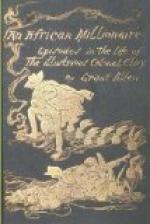Which was true, no doubt, but by no means consoling.
We returned to the Grand Hotel. Charles was fuming with indignation. “This is really too much,” he exclaimed. “What an audacious rascal! But he will never again take me in, my dear Sey. I only hope he’ll try it on. I should love to catch him. I’d know him another time, I’m sure, in spite of his disguises. It’s absurd my being tricked twice running like this. But never again while I live! Never again, I declare to you!”
“Jamais de la vie!” a courier in the hall close by murmured responsive. We stood under the verandah of the Grand Hotel, in the big glass courtyard. And I verily believe that courier was really Colonel Clay himself in one of his disguises.
But perhaps we were beginning to suspect him everywhere.
III
THE EPISODE OF THE OLD MASTER
Like most South Africans, Sir Charles Vandrift is anything but sedentary. He hates sitting down. He must always “trek.” He cannot live without moving about freely. Six weeks in Mayfair at a time is as much as he can stand. Then he must run away incontinently for rest and change to Scotland, Homburg, Monte Carlo, Biarritz. “I won’t be a limpet on the rock,” he says. Thus it came to pass that in the early autumn we found ourselves stopping at the Métropole at Brighton. We were the accustomed nice little family party—Sir Charles and Amelia, myself and Isabel, with the suite as usual.
On the first Sunday morning after our arrival we strolled out, Charles and I—I regret to say during the hours allotted for Divine service—on to the King’s Road, to get a whiff of fresh air, and a glimpse of the waves that were churning the Channel. The two ladies (with their bonnets) had gone to church; but Sir Charles had risen late, fatigued from the week’s toil, while I myself was suffering from a matutinal headache, which I attributed to the close air in the billiard-room overnight, combined, perhaps, with the insidious effect of a brand of soda-water to which I was little accustomed; I had used it to dilute my evening whisky. We were to meet our wives afterwards at the church parade—an institution to which I believe both Amelia and Isabel attach even greater importance than to the sermon which precedes it.
We sat down on a glass seat. Charles gazed inquiringly up and down the King’s Road, on the look-out for a boy with Sunday papers. At last one passed. “Observer,” my brother-in-law called out laconically.
“Ain’t got none,” the boy answered, brandishing his bundle in our faces. “’Ave a Referee or a Pink ’Un?”
Charles, however, is not a Refereader, while as to the Pink ’Un, he considers it unsuitable for public perusal on Sunday morning. It may be read indoors, but in the open air its blush betrays it. So he shook his head, and muttered, “If you pass an Observer, send him on here at once to me.”




